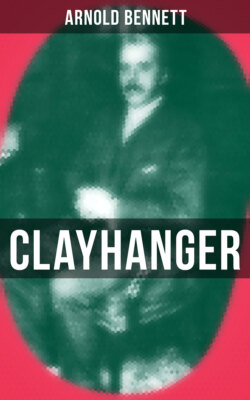Читать книгу CLAYHANGER - Arnold Bennett - Страница 41
На сайте Литреса книга снята с продажи.
Three.
ОглавлениеHe took the volume to the retreat of the desk, and there turned over its pages of coloured illustrations. At first his interest in them, and in the letterpress, was less instinctive than deliberate. He said to himself: “Now, if there is anything in me, I ought really to be interested in this, and I must be interested in it.” And he was. He glanced carelessly at the clock, which was hung above the shelves of exercise-books and notebooks, exactly opposite the door. A quarter past four. The afternoon was quietly passing, and he had not found it too tedious. In the background of the task which (he considered) he had accomplished with extraordinary efficiency, his senses noted faintly the continual trickle of customers, all of whom were infallibly drawn to Miss Ingamells’s counter by her mere watchful and receptive appearance. He had heard phrases and ends of phrases, such as: “No, we haven’t anything smaller,” “A camel-hair brush,” “Gum but not glue,” “Very sorry, sir. I’ll speak firmly to the paper boy,” and the sound of coins dragged along the counter, the sound of the testing of half a sovereign, the opening and shutting of the till-drawer; and occasionally Miss Ingamells exclaiming to herself upon the stupidity of customers after a customer had gone; and once Miss Ingamells crossing angrily to fix the door ajar which some heedless customer had closed: “Did they suppose that people didn’t want air like other people?” And now it was a quarter past four. Undoubtedly he had a peculiar, and pleasant, feeling of importance. In another half-minute he glanced at the clock again, and it was a quarter to five.
What hypnotism attracted him towards the artists’ materials cabinet which stood magnificent, complicated, and complete in the middle of the shop, like a monument? His father, after one infantile disastrous raid, had absolutely forbidden any visitation of that cabinet, with its glass case of assorted paints, crayons, brushes and pencils, and its innumerable long drawers full of paper and cards and wondrous perfectly equipped boxes, and T-squares and set-squares, with a hundred other contrivances. But of course the order had now ceased to have force. Edwin had left school; and, if he was not a man, he was certainly not a boy. He began to open the drawers, at first gingerly, then boldly; after all it was no business of Miss Ingamells’s! And, to be just, Miss Ingamells made no sort of pretence that it was any business of hers. She proceeded with her own business. Edwin opened a rather large wooden water-colour box. It was marked five and sixpence. It seemed to comprise everything needed for the production of the most entrancing and majestic architectural views, and as Edwin took out its upper case and discovered still further marvellous devices and apparatus in its basement beneath, he dimly but passionately saw, in his heart, bright masterpieces that ought to be the fruit of that box. There was a key to it. He must have it. He would have given all that he possessed for it, if necessary.
